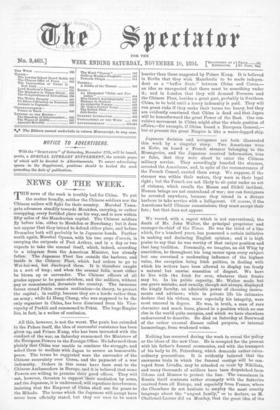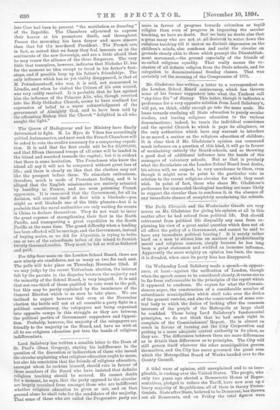Nothing has occurred during the week to reveal the policy
or the ideas of the new Czar. He is occupied for the present with his father's funeral ceremonies, and with the transport of his body to St. Petersburg, which demands rather extra- ordinary precautions. It is evidently believed that the enormous train in which the funeral eortbge will be con- veyed from Livadia, may be attacked en route by Nihilists, and many thousands of soldiers have been despatched from Odessa and Moscow to protect the line. The uneasiness in Russia itself contrasts rather strangely with the flatteries received from all Europe, and especially from France, where the Chambers do not hesitate to employ the most courtly language about the "august family," or to declare, as M. Ohallemel-Lacour did on Monday, that the great idea of the
late Czar had been to prevent "the mutilation or dwarfing" of the Republic. The Chambers adjourned to express their horror at his premature death, and throughout France the momning has been deeper and more sincere than that for the murdered President. The French are, in fact, so moved that we fancy they feel insecure as to the sentiments of the new Sovereign, and are a little afraid that he may renew the alliance of the three Emperors. The very little that transpires, however, indicates that Nicholas II. has for the moment no idea except to tread in his father's foot- steps, and if possible keep up his father's friendships. The only influence which has as yet visibly disappeared, is that of M. Pobiedonostzeff, who was, it is said, not summoned to Livadia, and when he visited the Crimea of his own accord, was very coldly received. It is probable that he has against him the influence of the Princess Alba who, though received into the Holy Orthodox Church, seems to have confined her expression of belief to a warm acknowledgment of the government of Almighty God, and to have been told by the officiating Bishop that the Church "delighted in all who sought the light."







































